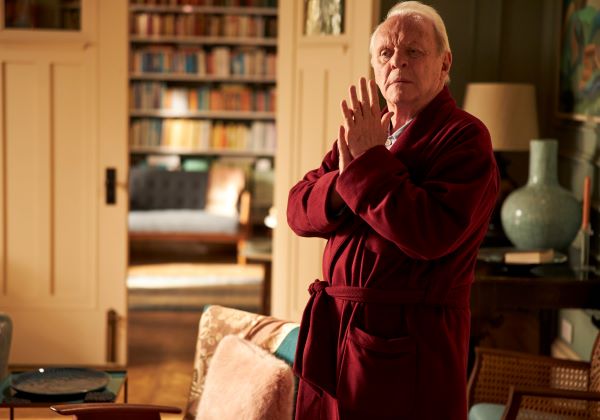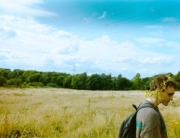
How do you prepare viewers for a film about the terrors of ageing? Films like Amour are the sort we brace ourselves, even if the experience in store is deeply moving. Like Pieces of a Woman, The Father is a film I’m guessing many pandemic viewers might not be prepared for, yet it would be challenging at any time. Director Florian Zeller, in his film debut, adapts from his award-winning play, and regardless of how ready one is for the subject matter, the experience is striking.
In his early 80s, Anthony (Anthony Hopkins) has dementia. As his condition worsens, his daughter Anne (Olivia Coleman) faces increasing pressure to figure out how to care for him. He is defiant toward the live-in nurses she hires, as well as anxious, at times belligerent, and confused. Her partner, Paul (Rufus Sewell), is openly nasty toward Anthony and pressures Anne to have him put in a home. (There was another daughter, Lucy, now absent.) Anthony lives in his flat on his own until he moves in with Anne and Paul, and there becomes confused as to which flat he is in.
The above is an admittedly sketchy outline, yet it represents the majority of what we know to be true in this slippery film. This is because we view this story not as an objective observer but through Anthony’s deteriorating gaze. Consequently, we are never entirely sure of where he is, who he is talking to, or when what we see is occurring. A character bearing the name “Anne” might appear with Olivia Williams in her place or later with Coleman; Mark Gatiss might stand in for Paul instead of Sewell; Anthony might open his door to a hallway that looks more like one in a nursing home rather than in his flat. Scenes repeat with eerie similarities and telling differences.
In short, the one thing we can be sure of is Anthony’s condition, and Zeller’s ability to convey his state of mind is remarkable. This is due, in no small part, to Zeller’s skill as a writer and director and the virtuosity with which he brings to life the shifting interior where the action takes place. Yet Hopkins also deserves much credit. For most of the film, he is at his very best. It is hard to think “famous English actor” as you watch him. He is so vulnerable, angry, and frightened, shuffling around his flat like a scared animal. Those who are familiar with dementia or Alzheimer’s will recognize the bewildered looks and the preoccupation with certain details (Where am I? Who are you?) that he so believably conveys. All the performances are strong, and the precision with which these performers deliver their contradictory truths is uncanny.
There is no denying that the experience of watching it is relentless, nor that, in spite of its narrative trickiness, we are sure of where it’s headed. Neither are problems in themselves—the film is so clearly intended to be as grueling as memory loss itself, with a tragic sense of inevitability. However, not every character is as convincing as Anthony. Paul, for instance, seems too cruel to be in a relationship with someone as kind as Anne. That might not matter—we are supposed to see him as Anthony does, yet too often he feels like a device to ramp up the dramatic tension. Also, Amour, which is 30 minutes longer than The Father and even sadder, felt shorter.
More importantly, there is a scene toward the end that falters significantly, pushing the film’s themes past believability and into over-the-top redundancy. Here, Hopkins’s performance loses its organic nature and seems more like the display of an effective bag of tricks. It is a significant enough misstep to prevent the film from becoming a fully satisfying experience.
If The Father does not consistently work as well as Amour, or Andrew Haigh’s 45 Years, it is still impossible to dismiss. Irrespective of one’s reservations, Zeller tackles a tough subject in an impressively creative way.






Leave A Comment